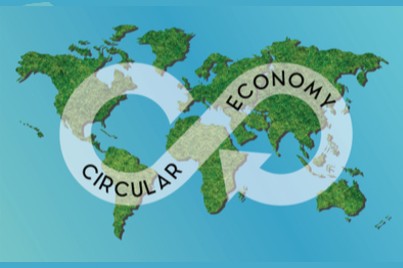How collaboration will help establish a circular economy in the MENA region
27 Dec 2020
Ever since the industrial revolution, economic development in large parts of the world has been heading in one direction, towards a “throwaway society”. Economic growth has revolved around a “take, make, use and waste” model: we take resources out of the ground, make products and discard them as waste when they are no longer needed.
The alternative to this wasteful linear approach is a circular economy – a way to decouple economic growth from extracting resources. There are, essentially, three principles involved: designing out waste and pollution, keeping products and materials in use and regenerating natural systems.
Embracing the circular economy represents a substantial opportunity for the Mena region.
Building circular economic cycles in some of the areas that create the most waste will benefit citizens, governments, local businesses and multinationals with a significant presence in these markets. It is also an investment opportunity, and the challenges waiting to be addressed are diverse.
Construction, for example, is one of the largest sources of waste in the world, and also represents the largest stream of urban waste generation in GCC countries.
The region’s water supply is also highly stressed, and arable land is in short supply. This results in a heavy reliance on global food imports and limited potential to increase food production through traditional farming methods.
Yet, food loss and waste in Mena are estimated at up to 250kg per person and over $60 billion annually. Sources of food waste and loss extend throughout the value chain, from production to consumption.
At the same time, recycling rates are low, particularly in the GCC. Egypt is targeting an 80 per cent garbage recycling rate over the next seven years, but in many parts of the region, waste collection and recycling is carried out by an informal sector only.
By adopting a circular model, the Mena region could reduce waste problems dramatically. According to a study by PwC, the GCC alone could reduce its carbon emissions by 150 million tonnes – with a large share attributable to electricity savings.
Across the board, there is a potential for savings of almost $138bn by 2030, corresponding to nearly one per cent of the GCC’s cumulative GDP between 2020 and 2030.
This is largely down to realising substantial resource and energy efficiencies, which will also help the region optimise the use of its natural resources − not in the least its diminishing water supplies and arable land, benefitting the regions’ food security.
Unsurprisingly, the circular economy also opens new revenue streams and business opportunities, both for existing businesses and start-ups. This has a positive, corollary effect: new opportunities for job creation and meaningful employment among local communities.
Given this scale of untapped potential, it’s important to realise that a circular economy cannot be achieved single-handedly. It will take a collaborative approach not only between the Mena countries but also between investors, governments and private enterprises who collectively align on the value that the circular economy can bring for people and the planet.
The experiences of China, France and the Netherlands provide robust examples for countries in the Mena region to follow. There are many examples of taxes or fiscal incentives in support of circularity. Denmark, for instance, has introduced a raw materials tax, and China has removed VAT on goods made from recycled materials. At the same time, public procurement needs to play a significant role in driving demand for remanufactured products through its tendering processes.
Businesses have a crucial role in enabling customers to consume responsibly and ensuring suppliers and partners follow the highest standards of sustainability. All of Majid Al Futtaim’s operating companies, for example, will have circularity at the core of their operations by 2030.
Cross-industry collaboration with suppliers, customers and the surrounding ecosystem is the only way to build a circular economy whose benefits resonate throughout society. There is a significant role here for multinationals with a strong base in the region to set an example, based on best practice from their home markets.
There is also an opportunity for Mena to tap into building international investor interest in how well a company handles environmental, social and corporate governance. This is evidenced by the successful launch of numerous green sukuks. The Saudi Electricity Company’s $1.3bn green bond was significantly oversubscribed, as was Majid Al Futtaim’s $1.2bn one.
But more sovereign institutions need to get involved to lend further weight to this trend, as exemplified by Egypt’s launch of its first ever green sukuk in October and Saudi Arabia’s Islamic Development Bank’s first green issuance in November.
The opportunity is there for Mena to emulate the progress made by other regions of the world. All it requires is continued and accelerated action from leading businesses, public bodies and investors. With that, we will see a snowball effect with more and more stakeholders joining the fight against climate change. And that fight will be integral to securing a sustainable future of our region.
This article was first published in Thenationalnews.com
X





